Zoho Desk is an affordable and widely used help desk that offers ticketing, automation, and self-service tools under one roof. But many teams eventually hit roadblocks that make daily work harder than it should be.
Customer reviews of Zoho Desk consistently highlight clunky workflows, an outdated interface, and weaker reporting compared to other platforms. Some teams feel locked into Zoho's ecosystem, where integrations don't run as deep as they'd like. Others find that the system feels over-engineered for their actual needs, slowing down adoption and daily use.
If these challenges sound familiar, it may be time to explore other options. The Zoho Desk alternatives below offer the same core capabilities, but each brings unique strengths; whether that's a more intuitive interface, stronger integrations, or features that put customers first.
1. Help Scout — Best Zoho Desk alternative for teams who value simplicity and great customer experiences
Help Scout is a great fit for SaaS companies, direct-to-consumer brands, and growing teams that want to scale support without adding complexity.
It feels closer to an intuitive inbox than a traditional help desk, and it enables teams to stay organized without forcing customers into an impersonal ticket number experience. With built-in AI tools, automation, and a lightweight setup, it’s a strong choice for companies that want to move quickly while maintaining high-quality customer interactions.
Shared inbox built for helping customers
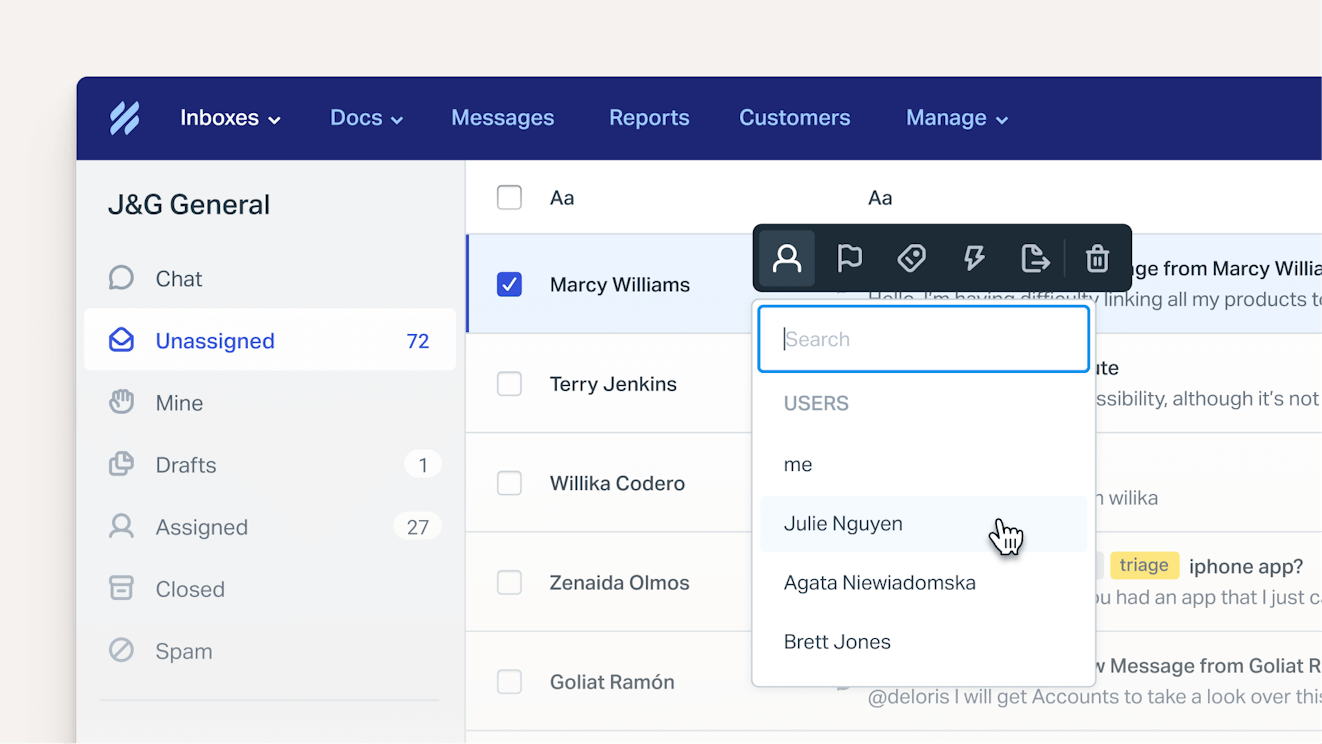
Help Scout's inboxes, tags, and assignments can help your team keep things organized.
Help Scout’s shared inbox gives your team a single place to manage conversations across email, chat, and social. Its interface is more intuitive than Zoho Desk’s, which feels less focused on customer conversations and more like a standard ticket-oriented support tool.
Some of the key features that help support teams collaborate and serve customers in Help Scout include:
Collision detection: Help Scout displays who is viewing or replying to a conversation, preventing duplicate replies and extra work.
Saved replies: Insert pre-written responses to common inquiries with one click.
Assignments and private notes: Assign conversations to the right teammates and collaborate internally, right in the thread, without the need to leave Help Scout (i.e., no more going to Slack to track down a teammate). This makes it easier for agents to pick up where another teammate left off, too.
Conversation history: When a frustrated customer emails for the fourth time, you see their full history immediately — no hunting through old messages or asking, “Can you describe what happened?” Customer context is right there.
Tags and custom fields: Use these features to easily categorize conversations for reporting and use in workflows.
Inbox views: Focus on specific subsets of conversations, like those that are urgent or from VIP customers.
Snooze and send later: Set healthy boundaries while still delivering timely service by deciding when you respond to a message.
While Zoho Desk includes many of these features too, reviews and forums typically mention that setting up Zoho is difficult and many features experience reliability issues or inconsistent behavior. Overall, Help Scout’s approach is more straightforward, more focused on customers, and far easier for new users to learn quickly.
AI and automation to boost efficiency
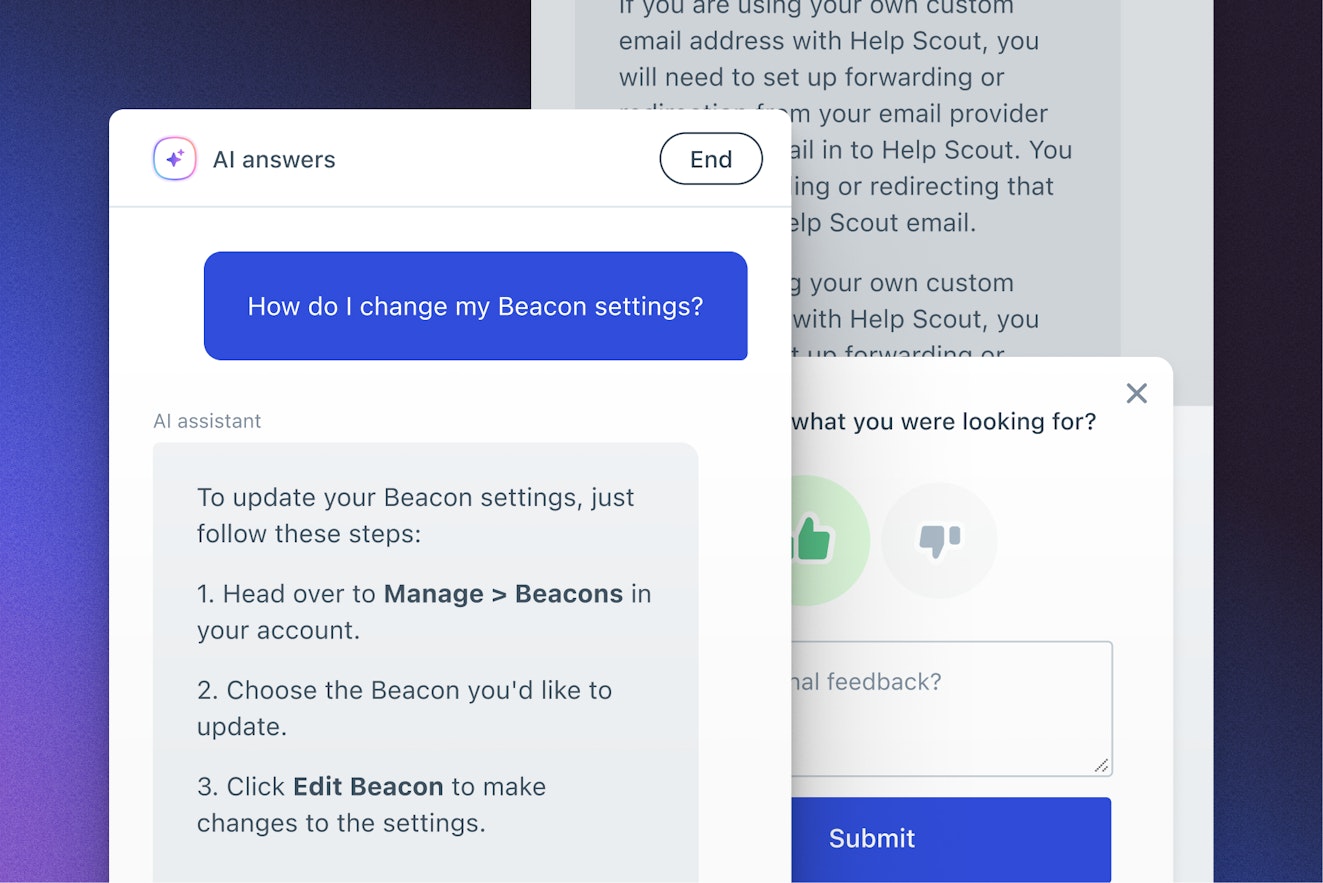
Every Help Scout plan includes automation and AI features to help teams save time:
AI Assist can expand, shorten, or translate messages with one click.
AI Summarize condenses long threads so teammates can get up to speed quickly.
AI Drafts generate on-brand responses using your knowledge base and past replies.
AI Answers is a chatbot that instantly resolves common questions by using content directly from your Docs library or website.
Workflows let you automatically route conversations, trigger follow-ups, and apply tags based on predefined rules.
Compared to Zoho Desk, which offers automation but often requires more setup and admin expertise, Help Scout’s AI tools are easy to adopt and built into the everyday agent workflow.
Proactive messages for customer engagement
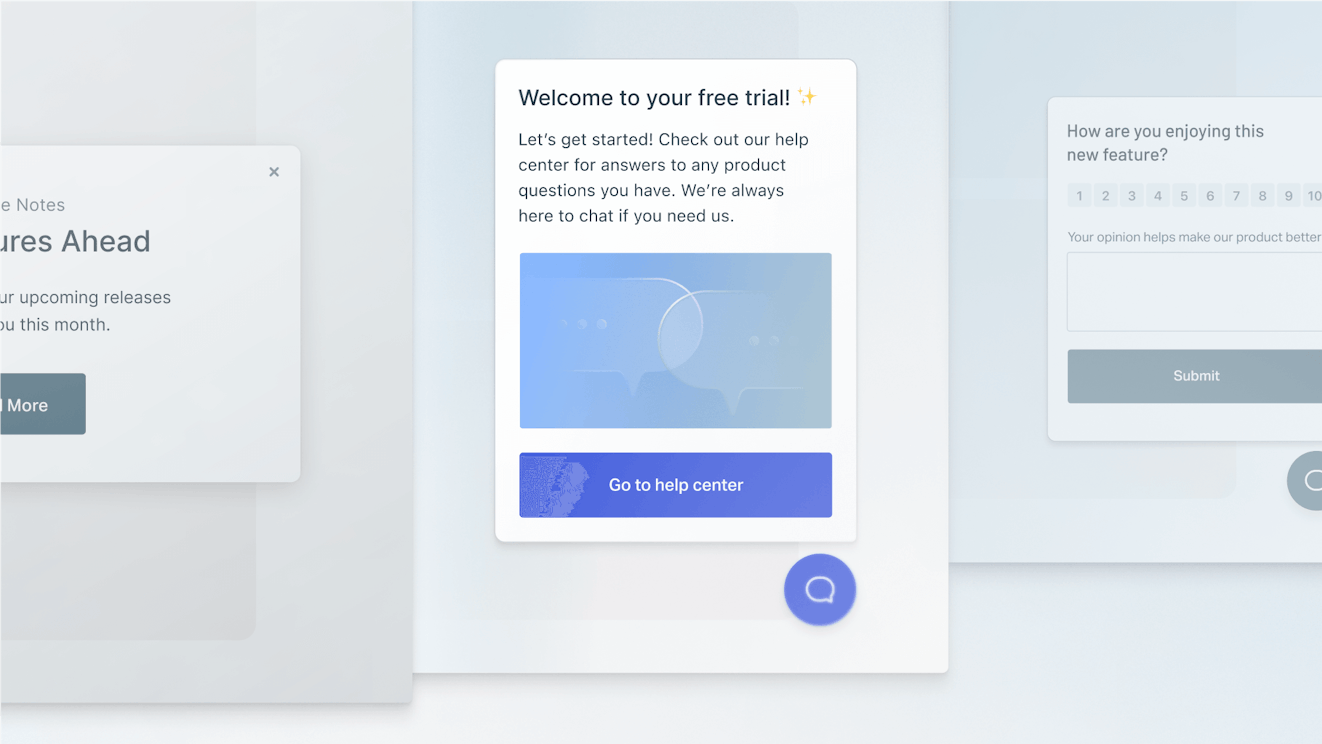
Help Scout’s Beacon widget enables you to proactively engage with your customers:
Announce new features or limited-time promotions right inside your product or website.
Trigger contextual help articles when customers are stuck on a checkout or onboarding page.
Request feedback or surface NPS surveys after key moments, like a purchase or renewal.
Guide high-intent visitors with nudges that reduce drop-off and improve conversions.
For example, you can set up contextual messages that appear when someone lingers on your pricing page or abandons their cart.
Help Scout's Beacon makes this kind of behavioral targeting easy, while Zoho Desk's proactive messaging requires a separate SalesIQ integration and a more complex setup
Ecommerce and SaaS integrations
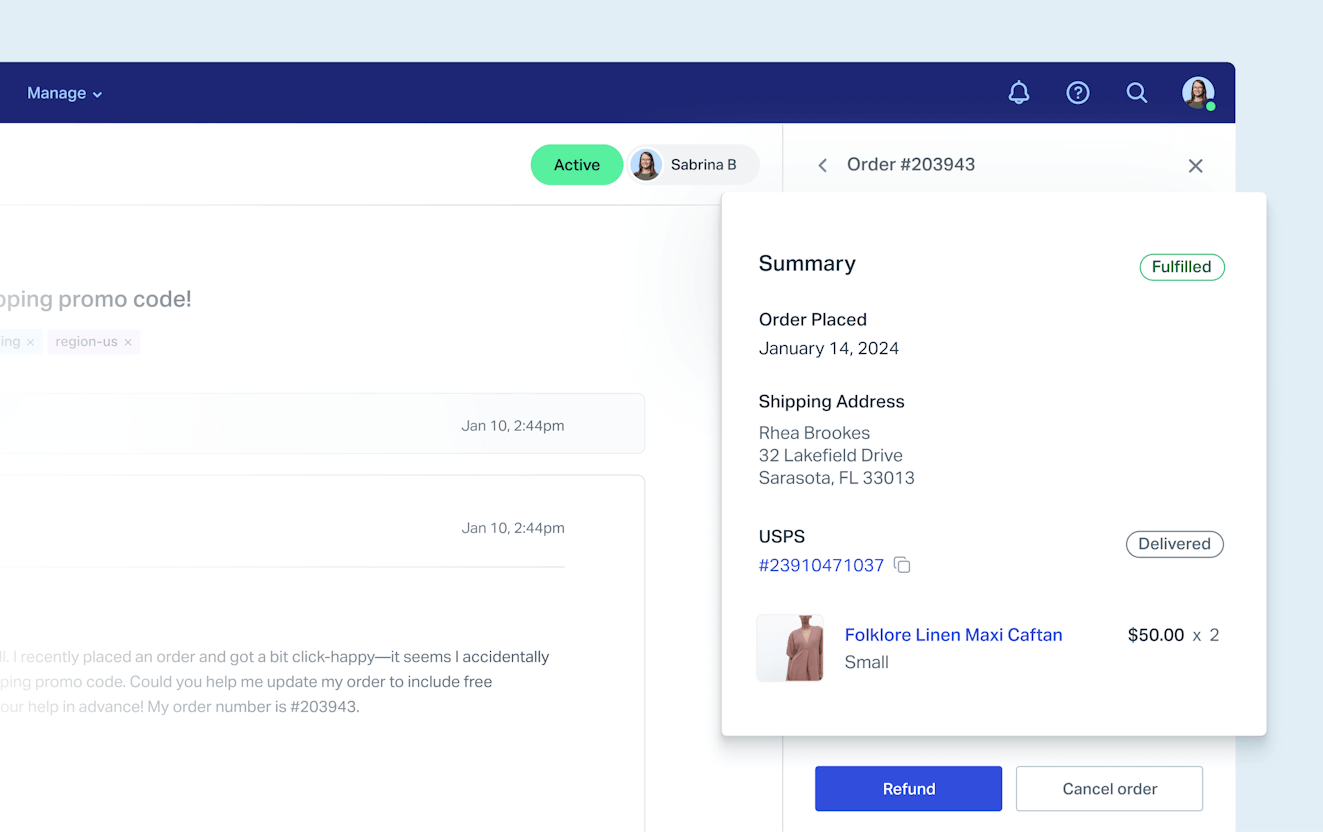
Help Scout integrates directly with tools like Shopify, WooCommerce, and Magento. That means agents can view and manage order details (like shipping status, line items, or payment history) without leaving the support thread. Refunds, cancellations, and updates can all be managed within the inbox.
Beyond ecommerce, Help Scout connects with hundreds of apps across CRM, marketing, and analytics. Teams using Zoho Desk often report frustrations with shallow or clunky integrations. Help Scout’s ecosystem is designed to be lighter-weight but more reliable.
Self-service and Docs knowledge base
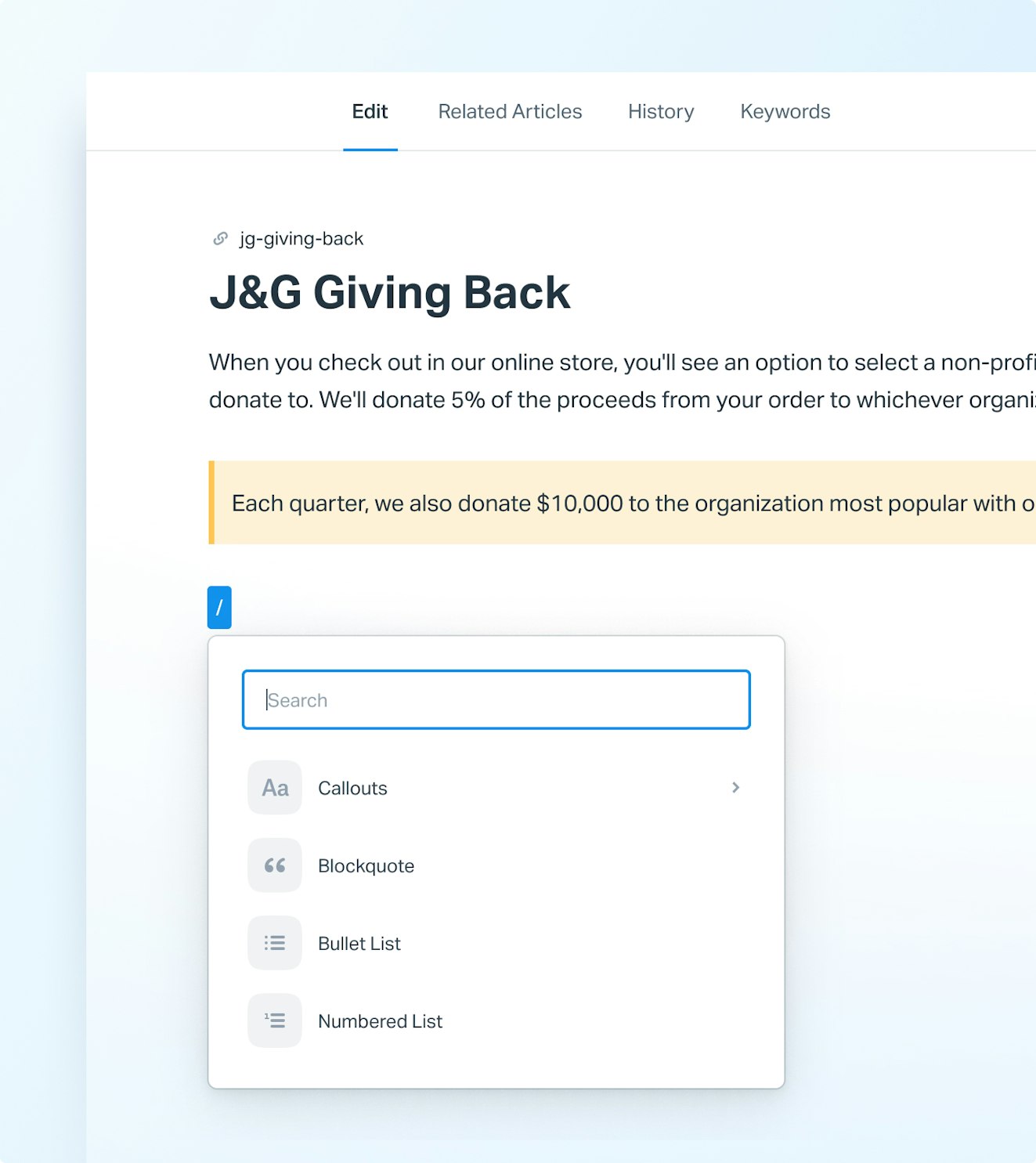
With Docs, you can build a branded knowledge base for FAQs, troubleshooting, and policies. It’s simple for teams to update and search-friendly for customers. Docs also ties into Beacon, so customers can search for answers before opening a new conversation.
This helps reduce conversation volume while maintaining a smooth customer experience.
Reporting and analytics
Help Scout provides built-in reporting that balances simplicity and depth, especially for reports that give managers the info they need:
Customer satisfaction (CSAT) tracking to measure service quality.
Team performance reports to monitor response times, resolution speeds, and workloads.
Trend analysis to spot recurring issues and refine processes.
Docs performance reporting to see which help articles are working and where customers still get stuck.
Why teams switch from Zoho Desk to Help Scout
More intuitive UI: Easier for new agents to learn and for managers to oversee.
Customer-first design: Conversations feel human, not ticket-based.
Responsive support: Help Scout’s support team earns high marks compared to Zoho Desk’s slower, less personal service.
Lower admin overhead: No need for a full-time system admin to keep things running smoothly.
Pricing
Free plan and trial available. View Help Scout’s current pricing.
Learn more about Help Scout:
2. Freshdesk — Best Zoho Desk alternative for budget-conscious teams

For teams looking to upgrade to something with similar features and pricing, Freshdesk is a good option. Freshdesk is one of the closest direct competitors to Zoho Desk, offering a wide range of ticketing, automation, and multichannel features at an affordable price point.
Zoho Desk customers sometimes struggle with limited integration options and a clunky interface, while Freshdesk provides a smoother user experience and a large marketplace of apps. It’s particularly well-suited for small to mid-sized teams that want a low barrier to entry but also need room to scale into omnichannel support as their business grows.
Freshdesk also offers a free plan like Zoho Desk, and more of its premium plans include AI, automation, and voice support, giving it broad appeal for cost-conscious companies.
Key features
Omnichannel ticketing across email, chat, phone, social, and web forms.
Large app marketplace with 1,000+ integrations across CRM, ecommerce, and productivity tools.
Freddy AI for intent detection, ticket suggestions, and automated replies.
Workflow automations to route tickets, set SLAs, and trigger escalations.
Self-service tools including a customizable knowledge base and community forums.
Reporting and analytics for agent performance, SLAs, and customer satisfaction.
Why teams switch from Zoho Desk to Freshdesk
Free and low-cost plans make it easy for small teams to start without a big investment.
Broader integrations mean less ecosystem lock-in compared to Zoho.
More intuitive UI that helps agents onboard faster.
Built-in AI (Freddy) available on higher tiers, offering more automation options than Zoho Desk, which has AI (Zia), but is only available on the absolute highest tier.
Pricing
Free plan and trial available. Review Freshdesk's current pricing.
3. Zendesk — Best Zoho Desk alternative for enterprises with complex workflows
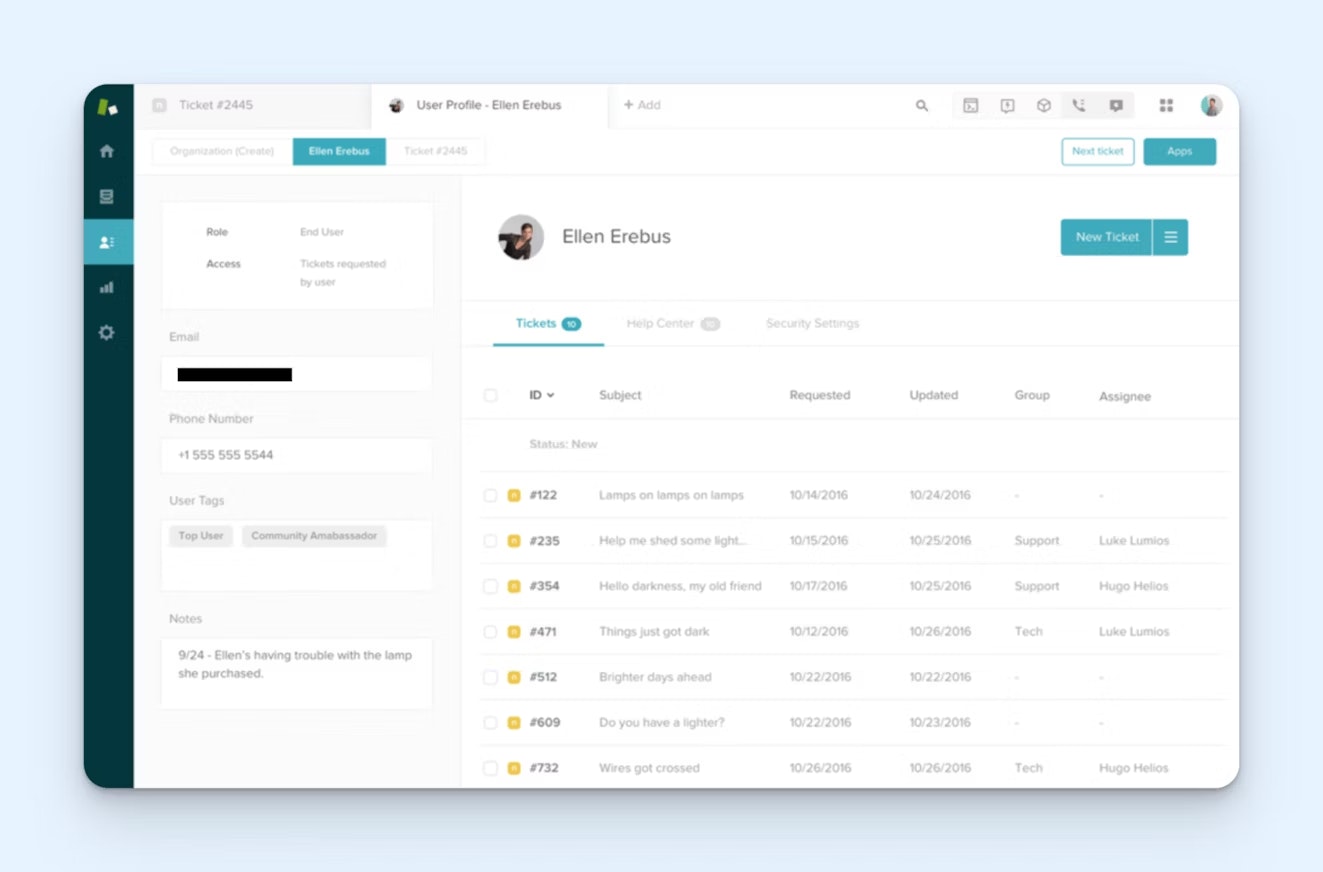
Zendesk is commonly used by large enterprises and fast-scaling SaaS companies. It offers everything Zoho Desk provides (ticketing, automation, reporting) but on a much larger scale, with deeper customization, advanced analytics, and a broad marketplace of integrations. It’s built for organizations that need highly structured workflows, strict SLAs, and cross-functional visibility across global teams.
The tradeoff is complexity: Zendesk can be overkill for smaller companies, but it’s hard to beat when you need support operations to run at scale.
Key features
Omnichannel support across email, chat, social, phone, and messaging apps like WhatsApp and Facebook Messenger.
Advanced automation and routing with triggers, macros, and custom business rules to ensure tickets go to the right team every time.
Extensive integration ecosystem with 1,500+ apps in the Zendesk Marketplace, plus a robust open API for custom connections.
Customizable reporting and analytics through Zendesk Explore, offering dashboards for SLAs, CSAT, agent performance, and more.
AI-powered bots and self-service with Zendesk AI to handle repetitive requests and surface relevant help articles automatically.
Enterprise security and compliance with roles, permissions, audit logs, and compliance certifications.
Why teams switch from Zoho Desk to Zendesk
Stronger reporting and analytics: Zendesk Explore gives far deeper visibility into customer trends and team performance than Zoho Desk’s native reporting.
Scalability for complex orgs: Global teams with multiple tiers of support benefit from Zendesk’s advanced routing and automation.
Robust integrations: With far more apps and an open API, Zendesk reduces the ecosystem limitations many Zoho Desk customers struggle with.
Enterprise scale: Trusted by some of the world’s largest companies, Zendesk offers the compliance and security features that regulated industries demand.
Pricing
Free trial available. Review Zendesk's current pricing.
4. Intercom — Best Zoho Desk alternative for support-led growth and proactive engagement
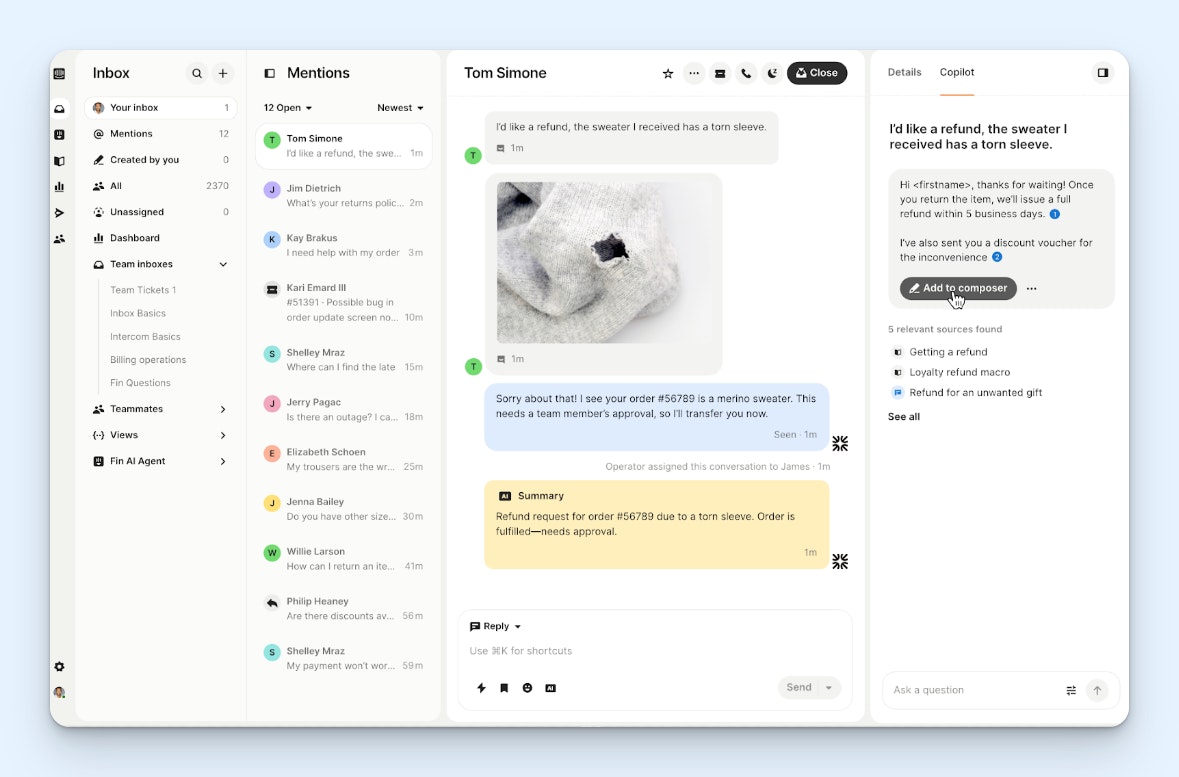
Intercom is built to drive customer engagement, retention, and growth. While Zoho Desk focuses on traditional ticketing, Intercom combines live chat, automation, and marketing-style tools that help businesses connect with customers in real time.
It’s especially popular with SaaS companies and startups that want to deliver fast, in-app support, proactively guide customers through onboarding, or use messaging to reduce churn. Intercom has also invested heavily in AI, offering powerful tools like Fin (their AI chatbot) that can handle common questions with high accuracy.
Key features
Unified inbox that combines email, chat, in-app messages, and social channels in one workspace.
Fin, Intercom’s AI chatbot, which answers customer questions instantly using your knowledge base, product data, and past interactions.
Proactive messaging and product tours to onboard new users, drive engagement, or announce updates inside your app or website.
Custom bots and workflows to route conversations, qualify leads, and automate repetitive support tasks.
Customer data platform (CDP) integration that pulls in context from CRMs and product analytics for more personalized replies.
Reporting and analytics that track conversation volume, bot performance, and customer behavior.
Why teams switch from Zoho Desk to Intercom
Stronger in-app support: Unlike Zoho Desk’s widget, Intercom is built for real-time, contextual communication inside your product.
Support + growth: Teams use Intercom to reduce churn, drive upsells, and improve onboarding, not just manage tickets.
AI-driven automation: Fin and custom bots reduce ticket volume by resolving common issues instantly.
Customer engagement focus: Proactive messaging and product tours give companies new ways to interact with users, something Zoho Desk doesn’t offer.
Pricing
Free trial available. View Intercom's current pricing.
5. Gorgias — Best Zoho Desk alternative for ecommerce brands needing rich customer data
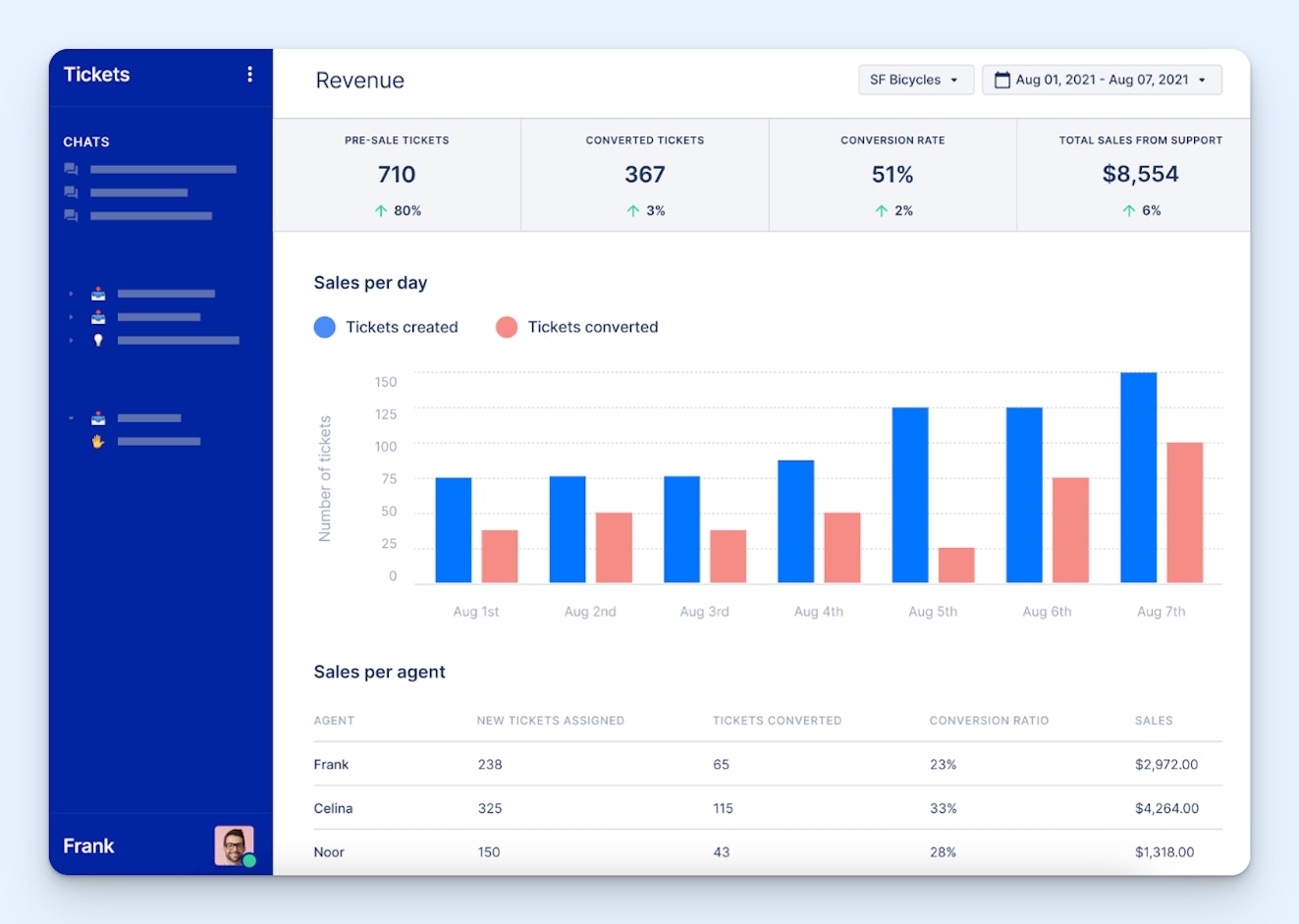
Gorgias excels at pulling detailed customer data into support conversations. It’s known for its ecommerce focus and ecommerce integrations, so its strength lies in giving agents immediate access to customer history, purchase data, and behavioral insights that make every interaction more personalized and efficient.
For brands on Shopify, Shopify Plus, WooCommerce, or BigCommerce, Gorgias eliminates the constant tab-switching that slows down support. Agents can view, edit, and even refund orders without leaving the conversation. This makes it a good choice for ecommerce businesses that deal with high ticket volume around shipping, returns, and product questions.
On top of support, Gorgias also doubles as a sales tool. Its live chat widget can display AI-powered product recommendations, helping convert shoppers who are browsing your site. For stores that want support to contribute to revenue growth, this dual role makes it especially valuable.
Key features
Shopify, WooCommerce, and BigCommerce integrations to surface customer and order details inside tickets.
Order management in the inbox: refund, cancel, or update orders directly from a conversation.
Shared inbox across channels, including email, chat, SMS, Facebook, Instagram, and WhatsApp.
AI-driven automation that detects intent and sentiment, auto-suggests replies, and routes tickets to the right team.
Macros and workflows for repetitive requests like “Where’s my order?” or “How do I return this?”
Revenue tracking to measure how much support interactions contribute to sales.
Ecommerce-specific reporting to track team performance and customer trends.
Why teams switch from Zoho Desk to Gorgias
Ecommerce-first design: Instead of adapting a general tool, Gorgias is designed specifically for online stores.
Deeper store integrations: Zoho Desk integrates with ecommerce tools but doesn’t allow order management inside the inbox.
Revenue-focused support: Gorgias shows the sales impact of support, while Zoho Desk reporting is more operational.
Multichannel ecommerce coverage: Social DMs and comments are handled natively, not bolted on.
Pricing
Free trial available. View Gorgias's current pricing.
6. Gladly — Best Zoho Desk alternative for high-touch customer service teams
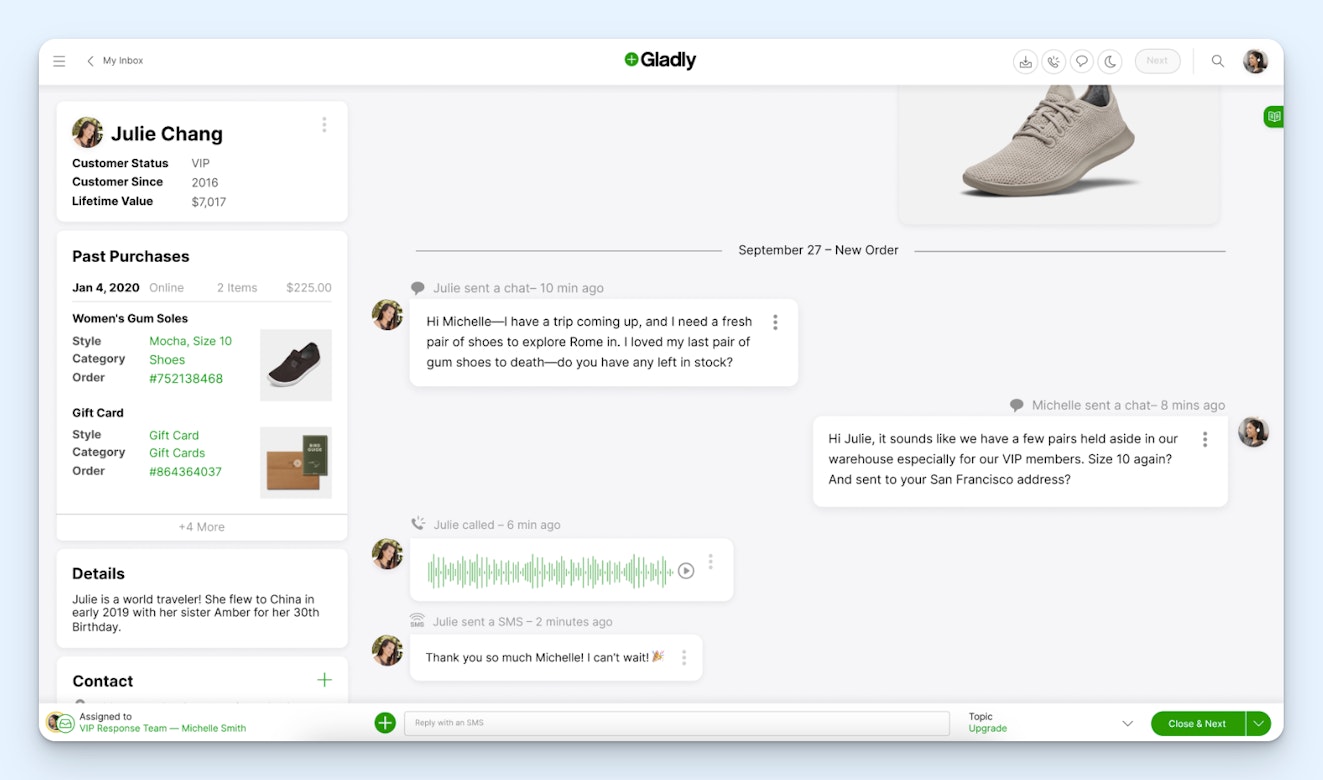
Gladly takes a different approach to support. Instead of making tickets the focus, it organizes everything around the customer. Every conversation across every channel is threaded into a single timeline. For teams that want to deliver personalized service and build loyalty, that customer-first view can be a big advantage.
Gladly’s focus on displaying the full relationship history makes it easier to resolve issues quickly and with context, especially for brands that prioritize high-touch service.
Key features
Customer timeline that shows the full history of conversations across voice, SMS, chat, email, and social.
Built-in voice and SMS support, reducing the need for third-party add-ons.
Knowledge base and self-service tools to help customers find answers on their own.
Personalization features like customer profiles and loyalty data built into the conversation view.
Automation and routing to make sure conversations go to the right person.
Why teams switch from Zoho Desk to Gladly
Customer-first vs. ticket-first: Gladly treats people like customers, not cases.
True multichannel timeline: Agents don’t need to stitch together history from separate tickets.
Stronger for loyalty-driven brands: Great fit for companies where long-term relationships matter.
Pricing
No free trial offered. Contact Gladly for current pricing.
7. Desk365 — Best Zoho Desk alternative for Microsoft 365 users
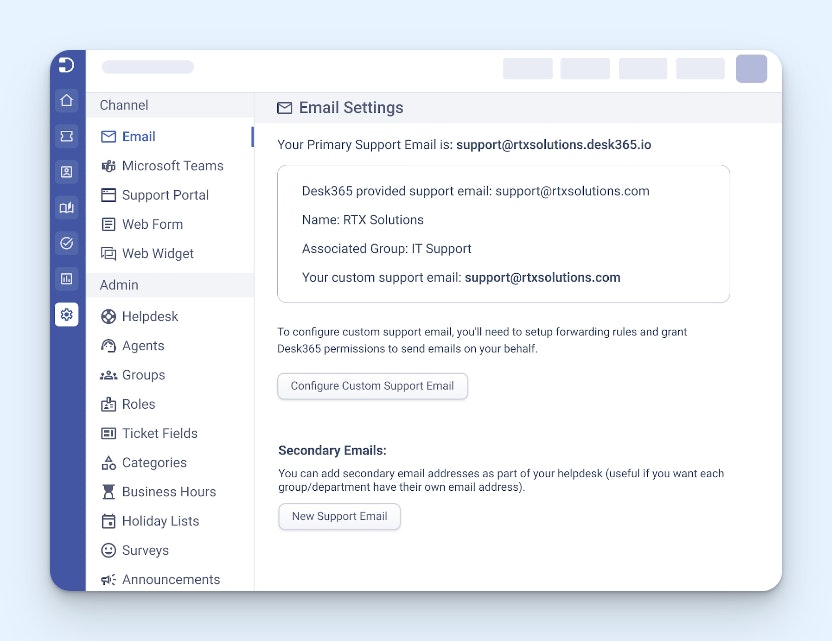
Desk365 is a lightweight help desk that’s tightly integrated with Microsoft Teams and Office 365. For organizations already working in Microsoft’s ecosystem, it’s a natural fit. Agents can manage tickets directly from Teams, without needing to switch between apps.
Compared to Zoho Desk, which requires more standalone setup, Desk365 feels simpler and more connected to the tools many businesses already use every day.
Key features
Microsoft Teams integration so agents can view, reply, and manage tickets without leaving Teams.
Omnichannel inbox for email, web forms, and Teams messages.
SLA and automation rules to keep service consistent.
Self-service knowledge base to help customers find answers on their own.
Reports and dashboards for tracking ticket volume and performance.
Why teams switch from Zoho Desk to Desk365
Deep Microsoft integration: Perfect for Teams-heavy organizations.
Lightweight and easy to adopt: Lower learning curve than Zoho Desk.
Affordable: Offers robust features at a fraction of the cost of larger platforms.
Pricing
Free trial available. View Desk365's current pricing.
8. Kayako One — Best Zoho Desk alternative for small teams that want a unified customer timeline
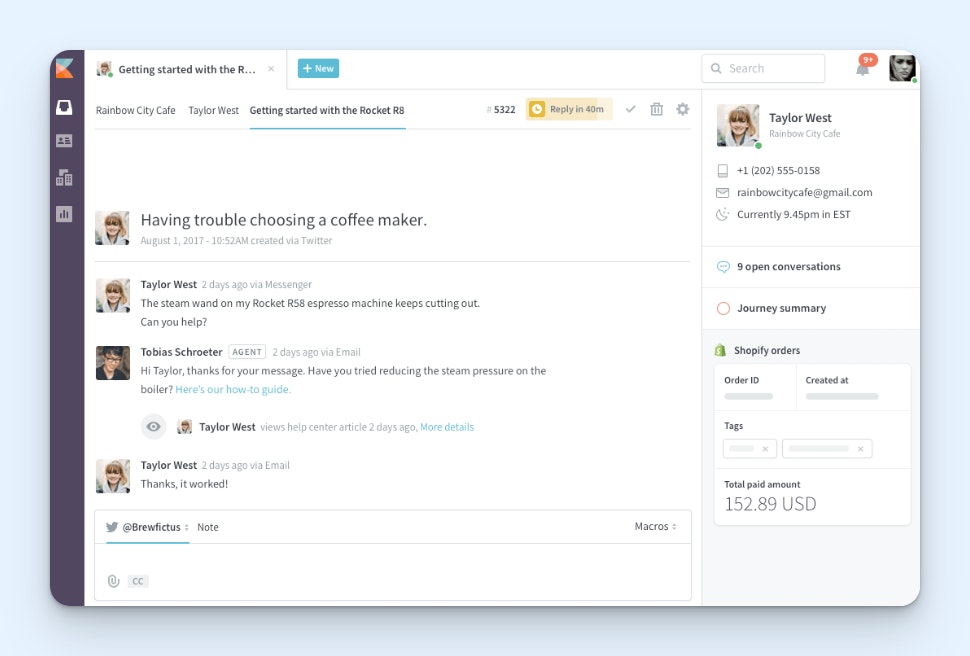
Kayako is a help desk platform that, like Gladly, is known for its unified customer timeline, but it has recently rebranded with a stronger focus on AI.
It still offers an approachable way to thread conversations across email, chat, and social, but it now also includes AI tools for tagging, routing, and summarizing conversations. This makes it a more modern alternative to Zoho Desk for teams that want customer context and automation in one place.
Key features
Single customer timeline that combines email, chat, and social interactions.
Live chat and help center to provide instant support and self-service options.
AI-powered automation to classify, prioritize, route, and tag conversations.
Customer profiles that surface past interactions and activity history.
Mobile apps so agents can manage conversations on the go.
Why teams switch from Zoho Desk to Kayako
Simpler interface: Easier for new agents to learn and adopt compared to Zoho Desk’s more complex UI.
AI-enhanced workflows: Built-in AI helps small teams manage higher volumes by automating tagging and routing.
Customer timeline focus: Threads all interactions into one view, helping agents deliver more personalized support.
Smaller team fit: Lightweight structure works better for small teams that don’t need Zoho Desk’s complexity.
Pricing
No free trial offered. View Kayako One's current pricing.
9. Tidio — Best Zoho Desk alternative for small businesses that want live chat and automation
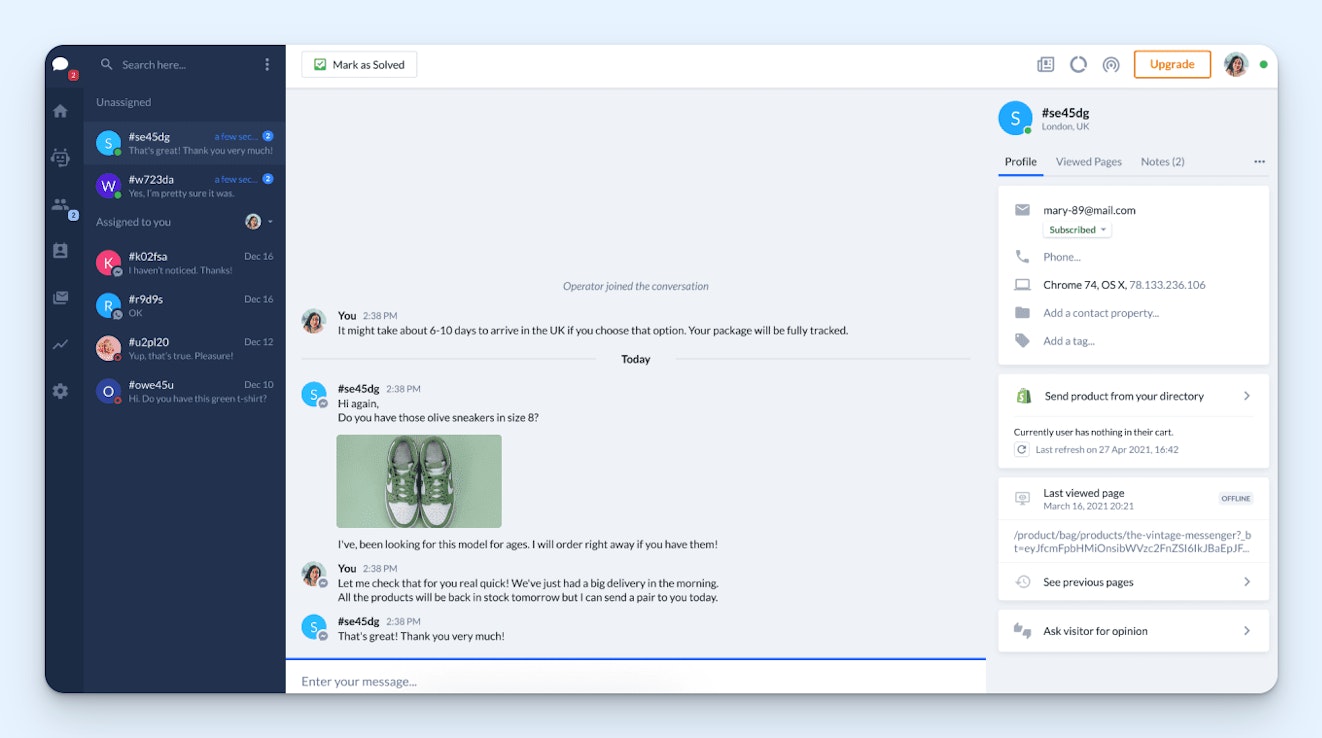
Tidio is a simple, affordable platform that combines live chat, chatbots, and email support in one tool. It’s an option for small businesses that rely heavily on chat to connect with customers and want automation to handle common questions without requiring a large support team.
Where Zoho Desk can feel too heavy for small teams, Tidio keeps things lightweight and easy to deploy.
Key features
Live chat widget that’s quick to embed on your site.
AI chatbots to handle FAQs, qualify leads, and route requests.
Shared inbox for managing email and chat in one place.
Integrations with Shopify, WordPress, and other ecommerce tools.
Basic reporting on conversation volume, bot performance, and customer satisfaction.
Why teams switch from Zoho Desk to Tidio
Lower cost and setup: Quick to deploy and more affordable than Zoho Desk for small teams.
Chat-first experience: Tidio’s live chat widget is stronger and more flexible than Zoho Desk’s basic option.
AI and chatbots are core focus: Unlike Zoho, where bots are just one feature among many, Tidio is built around chat and automation. Its bots handle FAQs and quality leads, and they route requests as a primary function, not as a secondary add-on.
Pricing
Free trial available. View Tidio's current pricing.
How to choose the best Zoho Desk alternative for your team
Switching help desks is no small decision.
The right platform should feel less like a lateral move and more like an upgrade — one that makes your team faster, your processes smoother, and your customer experience better.
When comparing Zoho Desk alternatives, keep these factors in mind:
Budget: Startups and small businesses may find more value in tools like Freshdesk, Help Scout, or Tidio, while enterprises may need Zendesk or Intercom for their scale and depth.
Industry fit: Ecommerce brands often choose Gorgias for its order management features, while SaaS companies lean toward Intercom or Help Scout for proactive messaging and customer-first design.
Ease of use: If your team wants a tool that agents can learn quickly, Help Scout and Kayako One are both strong options.
Feature needs: For advanced automation, reporting, and customization, Zendesk and Gladly stand out. For Microsoft-heavy teams, Desk365 may be the most natural fit.
A good next step is to list your top three non-negotiables, whether those are price, integrations, reporting depth, or other priorities, and use that list as your filter. From there, trial two or three platforms side by side. A short pilot run will usually help make the right choice clear for you.
The bottom line: Zoho Desk isn’t the only option. With the right alternative, you’ll get a platform that fits your business better today and scales with you tomorrow.











